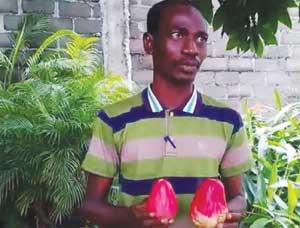There was no demand for the tropical bell apple when Gbenga Akinyemi started experiment on its farming and production in 2006. Now, the story is gradually changing as some farmers have discovered its value chain.

Its long list of health advantages, limitless wealth and job creation opportunities, and the ease of farming without fear of losses make bell apple seedling production very attractive.
Akinyemi, an agriculture expert, told TheNiche how individuals can make extra income growing the seedling.
According to him, a mature bell apple tree produces two harvests a year, with at least 2,000 seeds per harvest. Each seed is sold for between N50 and N100 depending on the size. In other words, a tree can yield at least N100,000 per harvest.
In Akinyemi’s calculation, a farmer who has 10 mature bell apple trees can make as much as N1 million in one harvest season. “The more trees he has, the merrier the harvest,” he explained.
Rising demand
Akinyemi, a graduate of Federal College of Agriculture, Akure, said growing bell apple is getting popular, unlike when he started it in 2006 and struggled to sell the seedling for only N200.
“Today, farmers are coming to ask for the seeds. There are huge demands for the seedling. Now, it is being sold between N2,500 and N3,500 per seedling, depending on the age,” he said.
Both the apple and the fruit seedlings are potential money spinners for the individuals and governments, federal and state, if cultivated for export.
“Depending on the size, a fruit is sold for about N50 or N100 and the tree bears over 1,000 fruits every fruiting season. I also sell the seeds. I teach people how to raise seedlings.
“Seedlings of three to four months can be sold for N1,500. Six months old seedling can be sold for N2,500 and nine months’ old seedling can be sold for N3,500.”
In his view, bell apple farming is an innovation the government can buy into for wealth and job creation for youths, but there is need for awareness to sensitise youths.
Empowerment opportunities
Akinyemi stressed that if the government supports bell apple faming, it can serve as an alternative to imported apple and Nigeria can in turn export it to earn revenue.
“I wish state governments can buy into this farming innovation because youths can make a living from it. Since it takes about three years for a tree to fruit from the day the seed is planted, forward looking states can invest in the plantation and then hand over to unemployed youths when they start fruiting so these ones can earn income.
“You can eat it in its wholesome nature and it is better than imported varieties. It can also be used in production of fresh juice, fruit concentrates, wine and also jams and marmalade. We can export it to improve our foreign exchange earnings.”
Although the bell apple tree grows in every part of Nigeria, the South South states – Delta, Akwa Ibom, Rivers, Cross River, Balyesa, and Edo – where the soil is clay-loamy and the climate clement is more suitable for its cultivation.
Health benefits
The fruit has a sweet sour taste, and any fruit with such taste likely has medicinal values good for the diabetic and the hypertensive.
Akinyemi said he has worked with nutritionists to discover the nutritional qualities.
“The health benefits are numerous. The fruit is very nutritious, and good for health. It is rich in calcium, potassium, and others. It is safer than imported apples sprayed with chemicals.
“It is great for digestion because it is a good remedy for digestive disorders and chronic dysentery. The trunk and branches are also beneficial in curing diarrhoea, dysentery and many other health disorders.”
He advocated that bell apple is bigger in size than imported apple; it is very attractive, and schools, golf clubs can grow the trees to beautify their environment. “This is better than planting trees that have no economic value.”
Motivation for start up
Akinyemi worked as Manager on different farms before he started experimenting on bell apple in 2006 after he was attracted by its reddish and plump outlook. He was amazed that such fruit was available in the country but nobody paid attention to it.
He discovered the health benefits in the course of his experiment and decided to explore the business potential.
Now, he also runs a consultancy, teaching individuals, organisations and government how to use this farming model to create jobs.
He expressed regret that the fruit is not on the market because of low awareness, which makes people not to ask for it except someone sells it to them directly.
“Once they taste it, they ask for more. People love its sweet and sour taste. So, I have been going round the country to create the awareness. Mine is a pioneering effort.
“Not enough is being done about financing of agricultural projects, and that is not encouraging. Though the government has made some effort, it is not enough, and that is not encouraging individuals to go into agriculture.”











